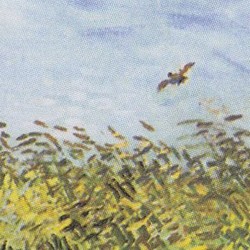
There are songs that suggest despair, there are desperate songs, and then, there is Du liebst mich nicht, one of the most unusual Lieder in Schubert's huge catalogue. The poem is by August von Platen, a poet a year older than Schubert who also died young, at 39; as was often the case, the composer knew his poetry through a mutual friend, Franz von Bruchmann.
In January 1821, Bruchmann went secretly to Erlangen to attend a course at the city's university; secretly, because university students had restricted movements at the time, and it was forbidden for an Austrian as Bruchmann to go to a German university, just in case of some ideas could circulate. The young man befriended Platen in Erlangen, and when he returned to Vienna in March he brought in his luggage a dedicated copy of Ghaselen, Platen's first volume of poetry. Bruchmann had told him, also a music lover, about Schubert's songs, and promised him he would suggest that he compose some Lieder from his poems. A year later he sent Platen a copy of Die Liebe hat gelogen, and he wrote to him during the summer that there was a second song with one of his poems, Du liebst mich nicht. It is a shame that there wasn't a third one, because these two are gorgeous, but it's a relief to know that Brahms also musicalized some of them some decades later.
With Ghaselen, Platen joined the orientalism so popular in those days; his collection was published two years after Goethe's West-östlicher Divan and a few months before Friedrich Rückert's Östliche Rosen. The poems were similar in form and content to ghazals; as listeners, we identify this kind of poems because of the repetition of a sentence; think, for instance, about Sei mir gegrüßt, which Schubert composed later in 1822 with a poem by Rückert.
In our case, the poet repeats six times the phrase Du liebst mich nicht [You do not love me] in a ten-line poem, so there's not much to be said about its subject: the poet hardly understands the words he heard. Because it's not a suspicion or a feeling: the other person explicitly said it. This is the first part of the poem, while in the second, the voice of the poem wonders about life from now on.
When a composer puts a poem into music, the poem somehow "vanishes". That is, we know the poem through the song, linked to the music, and we miss the first impression of the poem by itself. I don't know how I would have appreciated it if I would just have read it, but the music conveys great despair. The Lied is durchkomponiert, and we hear the changes as the poem advances, but the variation is slow. The most important change arrives at the last four verses, the questions, when the notes of the singer are shorter and the vocal line becomes a bit more agitated. Schubert repeats this musical stanza and adds some "Du liebst mich nicht" throughout the poem, so that this phrase is ubiquitous, and it sounds similar, but different; the musical accent falls on one pronoun or the other, and we wonder what is more important, me or you?
A few months after the song was released in 1826, a music journal in Leipzig published a review of the Opus 59, where it was included. The author was fond of Schubert and said that even the most critical should admit that his songs had "mind and soul"; he, in turn, conceded that he excessively "probed and constructed artifice", and "he modulated in such alien ways and so unexpectedly to the most remote regions in a manner unlike any other composer on the face of the earth, at least of Lieder and other small vocal pieces". He then referred to the first song of the opus, Du liebst mich nicht, saying that "the short and simple melody is torn practically through all keys of the entire scale, often with a little as two chord changes between one virtual extreme and another". He ended up saying, however, that, if well performed, the song "truly spoke, and said something substantial".
When you listen to the Lied, you will notice that from the third verse on the chords are fuller and vary really fast, as the critic said; if you look at the score, you'll see many accidentals that would overawe some amateur pianists, and I would say that's what the reviewer was afraid of. But we listen to this work performed by professional musicians, and I particularly like the contrast between the voice line, which may appear even lost in thought, and such an inconstant harmony, which tells us about the upset voice of the poet.
Schubert's penetrating understanding of the poems often amazes us. Did he grasp the poet's mood only from the verses? Did Bruchmann know something about Platen and shared it with him? As I explained to you a while ago, Platen was homosexual in a time that being homosexual was particularly difficult, and any obstacle that arose in a relationship was conditioned by this circumstance. Maybe Schubert knew it thanks to Bruchmann, or maybe he deduced it from a detail that a cultivated person would get in that time: the poem speaks of roses and jasmines, two usual flowers in Arabic and Persian poetry, and also speaks of daffodil, a flower that symbolized male beauty. Maybe Schubert was aware of this when he composed the song, maybe he was not.
Among the available recordings, I have chosen a masterful one, that of Dietrich Fischer-Dieskau and Gerald Moore. The baritone sings with a relative continence that doesn't decrease anyway the despair I talked at the beginning of the article. Pay attention to the endless nuances heard in the many "Du liebst mich nicht" ; I have the feeling that if he should sing this sentence ten more times, he would find the way of doing all of them different.
Mein Herz ist zerrissen, du liebst mich nicht!
Du ließest mich′s wissen, du liebst mich nicht!
Wiewohl ich dir flehend und werbend erschien,
Und liebesbeflissen, du liebst mich nicht!
Du hast es gesprochen, mit Worten gesagt,
Mit allzugewissen, du liebst mich nicht!
So soll ich die Sterne, so soll ich den Mond,
Die Sonne vermissen? du liebst mich nicht!
Was blüht mir die Rose? was blüht der Jasmin?
Was blühn die Narzissen? du liebst mich nicht!
My heart has been torn to pieces: you do not love me!
You let me know that you do not love me!
Although I appeared before you, pleading and entreating,
And overflowing with love, you do not love me!
You have said so, with words,
With so much certainty: you do not love me!
Shall I now miss the stars, miss the moon,
And the sun? For you do not love me!
What is it to me that roses bloom, or jasmine;
What is it to me that the narcissus blooms? You do not love me!
(Translation by Emily Ezust)


 The son...
The son... Hans...
Hans...










